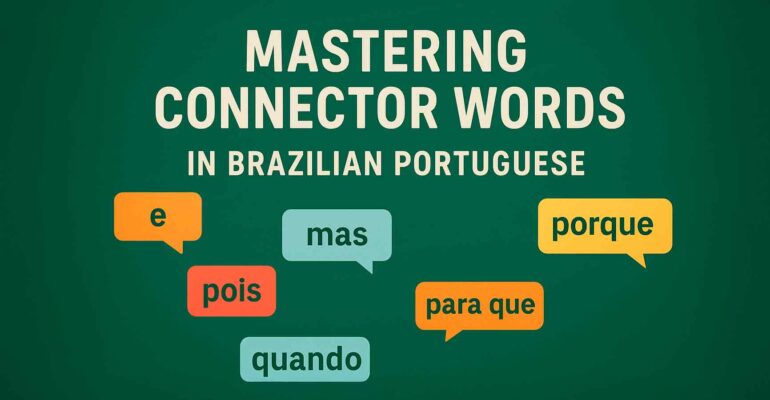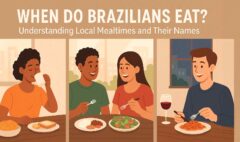Mastering Connector Words in Brazilian Portuguese
Mastering Connector Words in Brazilian Portuguese
Introduction
So, you’ve started learning Brazilian Portuguese and you can order a coffee, say where you’re from, and maybe even crack a joke. But something still feels… disconnected? That’s probably because you haven’t mastered connector words yet!
These tiny tools are the glue that holds conversations together. Without them, your speech sounds robotic. With them, you start to sound natural, fluent, and truly Brazilian.
Why Connector Words Matter
Think of connector words like bridges. Without them, your ideas are little islands. With them, everything flows — just like in a native speaker’s sentence. They help you express cause, contrast, time, purpose — basically, they bring life to your Portuguese.
What You’ll Learn in This Guide
In this guide, you’ll:
-
Discover different types of connector words
-
Learn real-life examples
-
Understand common mistakes
-
Get tips to practice and sound fluent
Ready? Let’s go!
What Are Connector Words?
Definition and Purpose
Connector words — or “conectores” in Portuguese — link parts of sentences. They’re like verbal duct tape: small but powerful. Examples include “e” (and), “mas” (but), and “porque” (because).
How They Shape Communication
Using connectors helps you explain your thoughts more clearly and smoothly. For example:
-
Without connector: Eu fui ao mercado. Comprei pão.
-
With connector: Eu fui ao mercado e comprei pão.
See? So much better.
The Major Types of Connector Words in Portuguese
Let’s break them down:
Additive Connectors
These add information.
-
e – and
Ex: Gosto de café e chá. -
também – also
Ex: Ela gosta de música clássica, também. -
além disso – besides that / furthermore
Ex: Ele é educado. Além disso, é muito inteligente.
Contrastive Connectors
These show contrast or opposition.
-
mas – but
Ex: Quero sair, mas está chovendo. -
porém – however
Ex: Estava cansado, porém feliz. -
entretanto – however/nevertheless
Ex: Ele estudou muito, entretanto não passou.
Causal Connectors
These express reason or cause.
-
porque – because
Ex: Estou em casa porque estou doente. -
pois – since / because
Ex: Não fui, pois estava ocupado. -
já que – given that / since
Ex: Já que você chegou, podemos começar.
Temporal Connectors
They indicate time relationships.
-
quando – when
Ex: Quando cheguei, ele saiu. -
enquanto – while
Ex: Ela lia enquanto ele cozinhava. -
depois – after
Ex: Vamos sair depois do jantar.
Conditional Connectors
These express conditions.
-
se – if
Ex: Se chover, não vamos. -
caso – in case
Ex: Caso precise, me avise. -
contanto que – as long as
Ex: Pode sair, contanto que volte cedo.
Purpose Connectors
They explain the goal or purpose.
-
para que – so that
Ex: Estudo para que eu possa passar. -
a fim de – in order to
Ex: Saiu cedo a fim de evitar o trânsito.
Common Mistakes with Connector Words
Misusing Contrast Words
Beginners often confuse “mas” and “porém” — both mean “but”, but “mas” is more informal. “Porém” is great for writing or formal speech.
Overusing “e” and “mas”
Yes, they’re easy to use, but relying on them too much makes your Portuguese repetitive. Spice it up!
Connector Words in Spoken vs. Written Portuguese
Formal vs Informal Use
Spoken Portuguese is way more relaxed. You’ll hear “tipo” (like) or “daí” (so, then) a lot in speech, but they’re rare in writing.
Examples in Real-Life Situations
-
Spoken: Ela chegou, daí todo mundo ficou quieto.
-
Written: Ela chegou, então todos ficaram em silêncio.
How to Practice Connector Words
Listening to Native Content
Podcasts, YouTube, novelas — these are your best friends. Pay attention to how natives link their ideas.
Creating Your Own Sentences
Write short paragraphs using different connectors. Try to rewrite one sentence multiple ways.
Using Flashcards & Language Apps
Apps like Anki or Quizlet can help you drill connector words and remember when to use them.
Real-Life Examples of Connector Words
Dialogue Example
João: Você vai à festa?
Ana: Não sei. Se chover, não vou.
João: Mas você prometeu!
Ana: Eu sei, porém tenho prova amanhã.
Paragraph Example
Eu queria viajar nas férias, mas não consegui. Porque meu chefe pediu um relatório urgente, tive que adiar. Depois, decidi fazer uma viagem curta no fim de semana. Foi ótimo, apesar de ter chovido muito.
Quick Reference List: Useful Connector Words
| Type | Connector | Translation |
|---|---|---|
| Additive | e | and |
| Additive | também | also |
| Additive | além disso | furthermore |
| Contrastive | mas | but |
| Contrastive | porém | however |
| Causal | porque | because |
| Causal | pois | since |
| Temporal | quando | when |
| Temporal | depois | after |
| Conditional | se | if |
| Conditional | contanto que | as long as |
| Purpose | para que | so that |
(And many more — use this table as a mini-dictionary!)
Advanced Tips for Fluent Use
Varying Your Connectors
Just like in English, repetition sounds boring. Mix up your connectors to keep your speech dynamic.
Understanding Subtle Differences
“Porque” vs. “por causa de”? Learn the grammar behind these to sound smarter and clearer.
Connector Words in Brazilian Culture
Expressiveness and Rhythm of Portuguese
Brazilians love to talk — expressively! Connector words help give that musical, flowing rhythm Brazilian Portuguese is famous for.
Conclusion
If you want to level up your Brazilian Portuguese, mastering connector words is a must. They’re not just vocabulary — they’re tools for fluency. Start listening, practicing, and playing with them in your conversations. Before you know it, your Portuguese will be as smooth as samba.
Learn Portuguese the Brazilian Way! 🇧🇷✨
At The Brazilian Ways, we believe language learning should be fun, immersive, and deeply connected to culture. Our unique courses help you speak Portuguese naturally while experiencing Brazil through its music, films, literature, and dance.
🎶 The Brazilian Music Club – Learn Portuguese through the rhythm and lyrics of Brazilian music. 🎬 The Movie Club – Improve your Portuguese while exploring the best of Brazilian cinema. 📖 The Short Story Club – Enhance your skills by diving into Brazilian literature. 💃 Portuguese for Zouk – Connect with the Zouk dance community while learning Portuguese.
✨ Join a vibrant community of learners and experience Brazil through language! 👉 Explore our programs and start today! 🚀
📲 Follow us on Instagram for more engaging content, language tips, and cultural insights: @thebrazilianwaysFAQs
1. What’s the best way to memorize connector words?
Use them! Practice in context, write sentences, and listen to natives.
2. Can I use European Portuguese connectors in Brazil?
Mostly, yes — but some expressions and usage might feel stiff or too formal in Brazil.
3. Do children in Brazil learn connectors in school?
Yes, from early grades, they’re taught how to write and speak using connectors properly.
4. How do I know which connector to use?
Understand the function (cause, contrast, time) and pick the one that fits. Experience helps!
5. Are there slang versions of connector words?
Definitely! Words like “tipo,” “daí,” and “então” are super common in speech.













